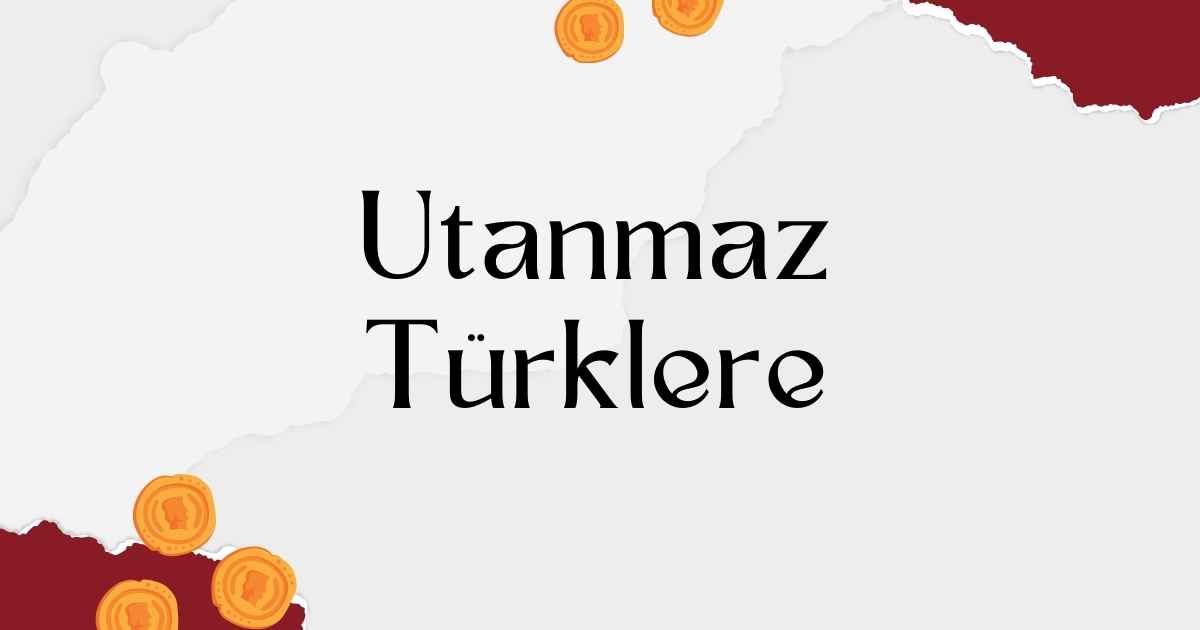The expression “Utanmaz Türklere,” in Turkish, known as “Utanmaz Türklere,” carries significance, reflecting aspects of identity, Pride, and societal reflection. Depending on its use, this phrase can elicit emotions and interpretations ranging from sharp wit to a bold statement that challenges societal norms. In the context of culture, where historical intricacies and contemporary issues intertwine in conversations, this term serves as a tool for examining the fusion of satire with cultural heritage.
Historical Context: Tracing the Roots of Turkish Identity
To grasp the meaning of “Utanmaz Türklere,” one must explore the development of identity molded over centuries by migration, empire expansion, and socio-political change. Originating in Central Asia and evolving through the Ottoman Empire to the formation of modern-day Turkey, Turkish identity has continuously developed due to encounters with cultures and internal shifts.
1. Central Asian Roots
The Turkic groups first emerged in Central Asia, where they crafted languages, customs, and societal systems. As they ventured westward, they encountered cultures from regions like the Middle East, Europe, and Asia Minor. These exchanges sparked a blending of aspects that have shaped the mosaic of Turkish heritage that endures today.
2. The Ottoman Influence
The Ottoman Empire, a power across Southeastern Europe, Western Asia, and North Africa for more than six hundred years, profoundly impacted the development of Turkish identity. It was an empire with people of all ethnicities and religions, and the Turks held critical roles in administration and military affairs. The lasting influence of the Ottoman Empire, characterized by its mix of cultures, traditions, and governing systems, still shapes society and national identity today.
3. Modernization and Westernization
In the 1900s, Mustafa Kemal Atatürk introduced a series of groundbreaking changes to modernize Turkey and bring it closer to standards. These reforms, such as making the state secular, implementing laws and education systems, and fostering patriotism, profoundly impacted Turkish society. During Atatürk’s era of change, there was an evolution in identity and how Turks viewed themselves as they navigated the delicate balance between preserving traditions and embracing modernization.
The Role of Satire in Turkish Culture
Satire has always been a part of culture, providing a means to question those in Power, societal standards, and cultural customs. Within literature and media, there exists a history of utilizing satire to address political and social matters by using wit and irony to inspire contemplation and introspection. The expression “Utanmaz Türklere” seamlessly aligns with this practice, allowing for an examination and evaluation of heritage and societal conduct.
1. Ottoman Satire
Satire thrived in the Ottoman Empire in literature and theater. Writers and actors employed satire as a tool to tackle concerns such as corruption, bureaucracy, and social disparities. This practice of expression allowed individuals to express dissent and challenge prevailing norms in a setting where open criticism carried risks.
2. Republican Satire
Satire thrived in the Ottoman Empire in literature and theater. Writers and actors employed satire as a tool to tackle concerns such as corruption, bureaucracy, and social disparities. This practice of expression allowed individuals to express dissent and challenge prevailing norms in a setting where open criticism carried risks.
3. Contemporary Satire
Satire plays a role in media and culture today, with satirical publications, TV programs, and online platforms serving as outlets for criticism and opposing viewpoints. The term “Utanmaz Türklere,” rich in significance, stands out as an instrument within this satirical heritage, enabling Turks to delve into conversations regarding self-perception, honor, and societal conventions.
Understanding “Utanmaz Türklere”
The term “Utanmaz Türklere” carries significance and can be understood differently depending on the situation. It might be seen as a criticism of behaviors or attitudes deemed brazen or improper. It could be taken humorously as an assertion of independence from societal norms.
1. Cultural Critique
“Utanmaz Türklere” is often employed to condemn actions that are viewed as disrespectful or out of line with expectations. This criticism may target people or groups believed to disregard principles or participate in conduct.
- Instances of Cultural Criticism: This expression could highlight behaviors like dishonesty, corruption, or disregard for customs. When used in this manner, it makes individuals or organizations for actions considered improper or unethical.
- Cultural Examination: The phrase promotes introspection on beliefs and standards by critiquing these actions. It encourages individuals and communities to contemplate what is deemed conduct and how these norms are upheld or questioned within society.
2. Satirical Pride
In some situations, “Utanmaz Türklere” can be seen as an expression of Pride. This interpretation involves redefining the term as a symbol of courage, celebrating the boldness to challenge conventions and push boundaries.
- Embracing Identity: Embracing the title of “Utanmaz” allows individuals or communities to assert their autonomy and defy norms. It empowers people to shape their identity according to their beliefs rather than conforming to external pressures.
- Wit: The satirical use of “Utanmaz Türklere” often incorporates elements of humor and irony. It spotlights the irrationality of norms or playfully points out the inconsistencies in Turkish culture.
The Power of Satire in Turkish Media
Satire is important in the media as it influences public discussions and questions those in Power. It offers a space for criticism and disagreement, empowering people to express their views and challenge established beliefs. “Utanmaz Türklere” exemplifies how satire can delve into identity and societal conventions.
1. Satirical Magazines and Publications
In Turkey, satirical magazines have a history of pushing boundaries and tackling subjects. These publications often rely on humor and satire to address social matters and receive praise and criticism.
- Leman: Two prominent satirical magazines in Turkey, Penguen, and Leman, stand out for their role in critiquing figures and societal conventions. Through their cartoons and articles, they cleverly use wit and irony to shed light on issues like corruption, censorship, and human rights violations.
- Obstacles and Restrictions: Satirical magazines in Turkey have encountered hurdles such as censorship and legal challenges. Despite these difficulties, they persist in upholding freedom of expression and stimulating discussions.
2. Television and Social Media
Satire has also made its mark on television and social media, appealing to an audience and sparking conversations on important topics.
- Television Programs: Comedy and parody are commonly used in satirical TV shows to offer insights into current events and political happenings. These programs draw in viewers and can shape public perspectives by presenting alternative viewpoints.
- Social Media Platforms: In Turkey, social media serves as a platform for satire, enabling individuals to share content and participate in conversations surrounding political and societal matters. Platforms like Twitter and Instagram provide an outlet for expression and critical discussions.
Broader Implications
In culture, employing satire and expressions such as “Utanmaz Türklere” carries meanings that delve into identity, dignity, and disagreement issues. It showcases the evolving essence of identity and the continual quest to shape and uphold it in a swiftly evolving society.
1. Identity and Pride
The incorporation of satire and expressions, like “Utanmaz Türklere,” showcases the nature of identity and the struggle between tradition and progress. It emphasizes the significance of defining oneself and the influence of humor and sarcasm in navigating obstacles.
- Harmonizing Tradition with Modernity: Turkish culture faces challenges in harmonizing practices with contemporary ideals. Satire offers a platform to explore this conflict and shape identity in a world.
- Cultural Strength: The capacity to question norms through satire illustrates strength and flexibility. It demonstrates a readiness to address challenging topics and participate in discussions about society’s direction.
2. Dissent and Dialogue
Satire can spark dissent and meaningful conversations, urging people to think and contribute to a more inclusive society.
- Questioning Power: Through its scrutiny of authority figures and norms, satire pushes for transparency and responsibility. It prompts individuals to reflect on power structures and the functions of government and organizations.
- Fostering Conversation: Satire facilitates conversations and debates by providing a platform for expressing viewpoints. It encourages empathy and mutual understanding by shedding light on perspectives and questioning notions.
Conclusion
The term “Utanmaz Türklere” captures the essence of heritage and the influence of humor in molding societal conversations. Whether employed as a form of criticism or as a source of admiration, satire mirrors the evolving character of traditions and the continuous endeavor to establish and uphold one’s sense of self in an evolving global landscape. Satire serves as a tool for individuals and communities to confront the complexities of life, participate in exchanges, and celebrate the vibrancy and variety within Turkish culture.




